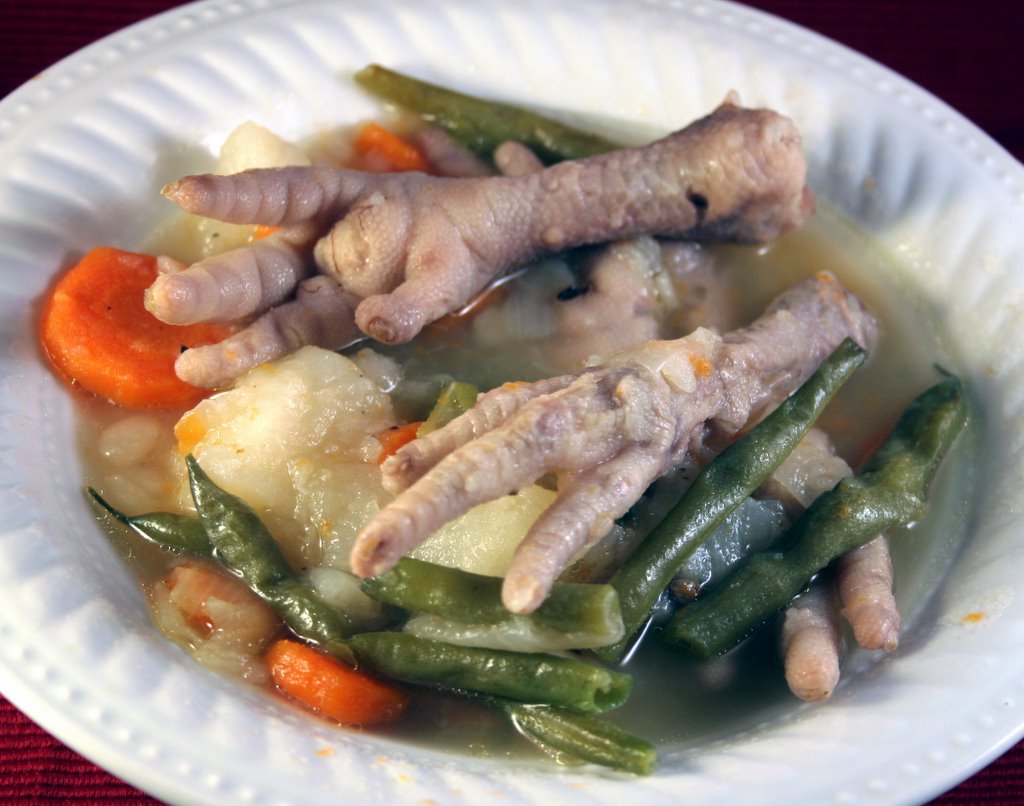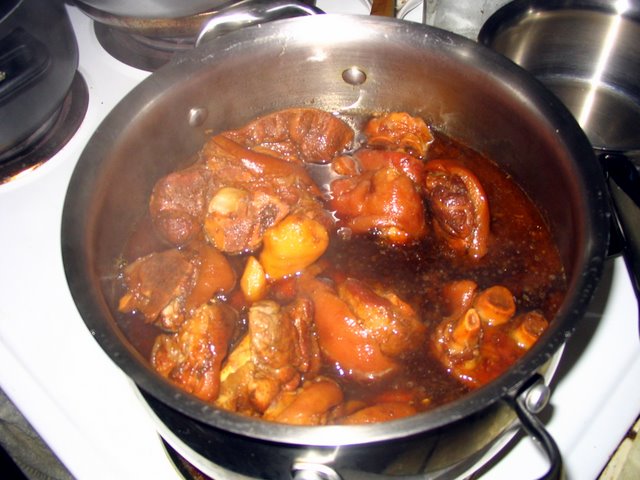
Chicken Feet Stew
Chinese students know who to call when they want homemade food.
By Yuqi Zha
It was 12 :05 a.m. Jackie Liu, a Chinese freshman at Bryn Mawr College, was still working in front of her desk. Words flowed out of her fingertips into the document on her laptop screen. The page count at the bottom showed she has finished 3 pages—2 more pages to be done for this assignment, which was due in 9 hours.
Some strange noises distracted her attention. Her stomach was growling.
At the same time, WeChat (a social media app like FaceBook popular among Chinese) messages were popping up on her phone screen relentlessly. It was time for Liu to do something about her hunger.
Liu opened WeChat and entered a WeChat group named Pangpang Lulu, which is the origin of all those messages. There are a couple of hungry Chinese students like Liu in that group, needing some energy to fight against their homework in this long lonely night.
The sole purpose of this group, now having 38 Chinese students, is to place orders collectively at a private Chinese home kitchen in Philadelphia, called Pangpang Lulu, which provides them with Chinese cuisines that cannot be found elsewhere.
Pangpang Lulu was opened on the 1st of February, 2018, located in an apartment near Temple University. Pangpang Lulu doesn’t have a storefront—it offers take-out and delivery services only, including late-night delivery, covering all regions in Philadelphia.
It is the only place that specializes in making spiced stew dishes, which are popular traditional dishes in China. Without the rental cost for a storefront, the prices of its dishes are affordable to students, with entries ranging from $10 to $13, and it quickly became popular among Chinese students in Philadelphia.
“We started Pangpang Lulu solely out of love for spiced stew dishes,” said Leslie Mou, one of the co-owners of Pangpang Lulu, who is also a junior at Temple University. “We think it is a shame that we can’t find such delicious Chinese dishes in Philadelphia.”
Mou came from Chengdu, the capital of Szechwan, where spiced stew dishes are very popular —and very hard to make. The key to success is the spiced soup base that is used to stew the meats for hours. It usually contains more than 10 different Chinese spices and even Chinese medicines.
In China, each restaurant specialized in making spiced stew dishes has its own recipe for the soup base, which determines the different smell and taste of the dishes. Like the recipe for Coca-Cola, the recipe for the soup base is the core trade secret of those restaurants.
The most common spiced stew meats are chicken feet, pork feet, pork ears, pork tails and other animal internal organs, which people from other countries usually dislike. But the Chinese love these stews.
“We use the recipe handed down in Leslie’s family from generation to generation,” said Tom Hu, the other co-owner of Pangpang Lulu, who also graduated from Temple University.

Pigs Feet Stew
Besides the recipes, timing and heat are also crucial.
Hu said, “It takes six to eight hours to make spiced stew dishes. How you manipulate the heat decides whether you can infuse the flavor properly and make the meats melt on the tongue.”
“Different vegetables and meats require different timing and heat,” added Mou.
It is hard for Chinese students to make these kinds of dishes on their own, without the recipes and the time it takes to make them right.
“The main reason behind the popularity of Pangpang Lulu is that it tastes really good,” said Cathy Zhang, a sophomore at Bryn Mawr College, who is also an active member in the WeChat group.
However, Pangpang Lulu is popular only among Chinese students.
“Our customers are mainly Chinese students in University City. We never had any American customers yet,” said Mou.
In addition to the exotic meats, Hu said, “Americans don’t like the taste of Chinese medicines in the spiced stew dishes.”
For Chinese, though, these meats are perfect for late-night snacks.
“First, they contain very little real meats, so they won’t get you fat,” said Juhan Tan, a freshman at Bryn Mawr College and an active member of the WeChat group. “Second, they are kind of hard to eat, so they will keep you busy. This helps to keep you awake and also relieve your stress when you have a paper due in four hours but are still facing a blank page.”
“Spicy spiced stew dishes are exactly what I want for my night,” said Liu.
The success of Pangpang Lulu largely owes to the growing number of students from China in Philadelphia.
According to a report by Philly Voice in 2015, in the academic year of 2013 to 2014, the University of Pennsylvania and Drexel University alone had more than 10,000 international students, 35.8% of which WHOM came from China.
The number appears to have increased since then. Chinese students at Bryn Mawr College have increased by 20 fold in 10 years, changing from only nine Chinese students enrolled in 2008 to 181 Chinese students enrolled in 2017, according to Patricia Launch, the director of International Student and Scholar Services and Advising at Bryn Mawr College.
“In the past, the main customers of Chinese restaurants were Chinese-Americans and Americans,” said Lamei Zhang, a staff at Philadelphia Chinatown Development Corporation, “But now more and more businesses have recognized the increasing population of Chinese students as a major source of spending power.”
For Chinese students at Bryn Mawr College, which is far away from center Philadelphia and located in a suburban neighborhood, the existence of Pangpang Lulu is precious.
“It was not possible to get late-night delivery of Chinese cuisines here at Bryn Mawr before Pangpang Lulu was opened,” said Charlotte Xu, a junior at Bryn Mawr College and the founder of the WeChat group.
“It is not very convenient for us to get to Chinatown, so the delivery service is very important for us,” said Zhang.
Esther Xu, a sophomore at Bryn Mawr College said, “We also don’t have many delicious Asian cuisines near campus.”
The increasing use of WeChat by Chinese students also prompts the success of Pangpang Lulu.
“Sometimes I was not hungry. But when I opened the WeChat group and saw so many people making orders, suddenly I wanted to eat something,” said Yuewei Wang, a senior at Bryn Mawr College.
“The only means of propaganda we have is WeChat,” said Hu. “People who like us will recommend us to their friends on WeChat.”
The increasing population of Chinese students in Philadelphia and their special type of lifestyle have opened up a huge market for more diverse and original Chinese dishes. Moreover, more and more Chinese students, like Mou and Hu, have joined this field, bringing with them the taste of home.
“In these two years. real authentic Chinese cuisines started to appear in Philadelphia,” said Hu. “For many Chinese students, American-Chinese food is outdated.”
